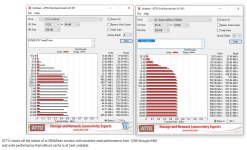I know, it was merely a test. Some games will always crash without one, some do not, it depends how they are programmed.
It's possible to just install more RAM tbh (but expensive), I don't think the game accessing the page file itself (regardless of which drive it's on) actually matters that much, the game files are what caused the gameplay freezing on my SSD.
I need to test the game a bit more to make sure the stuttering isn't happening after defragging the game files, but I played for a couple of hours last night and it was fine. One possible caveat, is that if the game files are changed with a game update, some of the files may need to be defragmented again.
You need to get your head around what the pagefile is for and how it is used by
Windows.
If the system is running low on physical memory, Windows will start to move pages out of physical memory into the page file. Which is why your bizzarre experiment with putting the pagefile on a RAM disk was doomed to failure - Windows started to move pages to the pagefile because it was low on physical memory, but because the pagefile was also in memory that just meant that it actually used more physical memory, so it had to free more physical memory and so on. If the system runs out of virtual memory (physical+pagefile) then Windows will start terminating processes which is exactly what then happened.
No application program needs a pagefile to be present. If there is no page file then all that happens is that an attempt to allocate more memory than there is physical memory will fail and the program will probably crash. But that is not because of the lack of pagefile, as the same can happen if the program attempts to allocate more than the sum of the physical memory and the space allocated to the pagefile.
In general, Windows memory management does work better if there is a pagefile, though; and for most desktop usage, just leaving the settings alone and letting Windows manage it is absolutely the best approach.
The freezing still seems to be happening occasionally unfortunately...
I've noticed that after the freezing occurs, the game loads more of the game files into the physical memory, reported as 'in use' in the Windows Resource Monitor. Initially, the game loads around 12GB, but it can rise to 13GB in some cases. I let the developers know about this SSD related freezing issue a few days ago, I guess there's a chance they might patch it still.
Also, the game gradually allocates a lot of RAM (5GB in my case) to 'standby' memory, where it tends to remain.
So, what happens here is that when the game loads and requests a big chunk of memory Windows will start to page out
other processes. Page out means it will write the contents of the physical memory pages from those applications into the page file so that the physical page can be used by the game instead. That's the activity you are seeing against the page file not anything to do with the game itself. The other thing which will happen is that Windows will shrink the amount of memory it's using for filesystem cache which can also increase the amount of I/O going on.
If those applications are themselves active, then Windows will at some point have to page them back in - i.e. read the pages back from the pagefile into physical memory. To do that it may have to page out part of the game's memory.
You need to look at what else you are running in the background to ensure you are not over-committing your physical memory.




